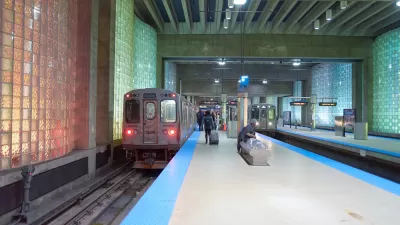Today, Mayor Rahm Emanuel will sketch out a fuller picture of the ambitious $7 billion public-private plan to upgrade Chicago's transit, schools, and parks, reports John Schwartz.
In a speech to be delivered today at the Chicagoland Laborers' Training and Apprentice Center, which The New York Times received an advanced copy of, Emanuel will outline the financing for the plan to expand the city's largest airport and improve its streets, water system, schools, community colleges, parks and commuter rail network.
The "audacious" plan represents a movement by states and cities across the country to take it upon themselves, often with public-private partnerships, to upgrade aging infrastructure without waiting for financing from a gridlocked federal government, notes Schwartz.
According to Robert Puentes, director of the metropolitan infrastructure initiative at the Brookings Institution, "There is tremendous interest in doing something different - people aren't waiting for the federal government to raise the gasoline tax or pass the carbon tax and have money raining down."
The plan will be partially funded by the newly created Chicago Infrastructure Trust, announced earlier this month. "Other funds will come from cost cutting, some from the savings in energy and water use from retrofitting buildings, and some from user fees, but 'none of these funds will come from an increase in property or sales taxes,' according to the speech."
While Chicago's history of corruption causes natural skepticism around major public initiatives, locals seem willing to give Emanuel the benefit of the doubt, at this point.
"'It's totally within reason for Chicagoans to be skeptical,' said Celeste Meiffren, field director for Illinois PIRG, an advocacy organization. 'That being said, it does seem that a lot of these projects are pretty worthwhile. If the mayor provides a lot of information to us as residents and taxpayers, gives us an opportunity to weigh in on these projects and involves our aldermen too - and makes sure we receive a fair value - it'll address a lot of the concerns we have here.'"
FULL STORY: $7 Billion Public-Private Plan in Chicago Aims to Fix Transit, Schools and Parks

Alabama: Trump Terminates Settlements for Black Communities Harmed By Raw Sewage
Trump deemed the landmark civil rights agreement “illegal DEI and environmental justice policy.”

Planetizen Federal Action Tracker
A weekly monitor of how Trump’s orders and actions are impacting planners and planning in America.

How Atlanta Built 7,000 Housing Units in 3 Years
The city’s comprehensive, neighborhood-focused housing strategy focuses on identifying properties and land that can be repurposed for housing and encouraging development in underserved neighborhoods.

In Both Crashes and Crime, Public Transportation is Far Safer than Driving
Contrary to popular assumptions, public transportation has far lower crash and crime rates than automobile travel. For safer communities, improve and encourage transit travel.

Report: Zoning Reforms Should Complement Nashville’s Ambitious Transit Plan
Without reform, restrictive zoning codes will limit the impact of the city’s planned transit expansion and could exclude some of the residents who depend on transit the most.

Judge Orders Release of Frozen IRA, IIJA Funding
The decision is a victory for environmental groups who charged that freezing funds for critical infrastructure and disaster response programs caused “real and irreparable harm” to communities.
Urban Design for Planners 1: Software Tools
This six-course series explores essential urban design concepts using open source software and equips planners with the tools they need to participate fully in the urban design process.
Planning for Universal Design
Learn the tools for implementing Universal Design in planning regulations.
Jessamine County Fiscal Court
Caltrans
Institute for Housing and Urban Development Studies (IHS)
City of Grandview
Harvard GSD Executive Education
Toledo-Lucas County Plan Commissions
Salt Lake City
NYU Wagner Graduate School of Public Service




























